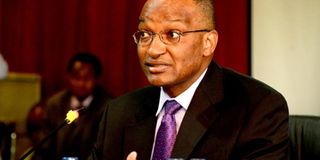New CBK governor and the curious religious organisation he belongs to

Central Bank Governor Patrick Ngugi Njoroge. Speaking at a seminar organised by CBK and Afreximbank, Dr Njoroge's deputy Ms Sheila M’Mbijiwe said Kenya had been shielded partly from the full economic shocks in the global economy through reliance on its African peers for trade. PHOTO | SALATON NJAU |
What you need to know:
- For those who know Dr Njoroge and his way of life, his single status is nothing to be surprised about.
Sometimes we of the media love to make mountains out of molehills. That was the case with the melodrama we created about the parliamentary vetting of Central Bank governor nominee Patrick Ngugi Njoroge and his bachelor status.
The MPs never set out to make a big fuss about it as was implied. Nor did anybody really expect they would reject his appointment because he doesn’t have a wife. Even Kitutu Chache North MP Jimmy Angwenyi’s reported offer to link the gentleman up with a certain lady must have been said with tongue-in-cheek.
For those who know Dr Njoroge and his way of life, his single status is nothing to be surprised about. He is a member of a very conservative organisation of the Catholic Church called Opus Dei (which translates to “Work of God”).
The thing about it is that it is keen on professional laypersons and not necessarily priests or nuns.
There are several layers of membership. One of the most important is that of those called numeraries.
These are celibate members who usually live in gender-segregated centres run by Opus Dei. Numeraries generally have normal careers but devote the bulk of their income to the organisation.
According to Opus Dei’s 1982 statutes, potential numeraries ordinarily “ought to have a civil academic degree or professional equivalent, or be able, at least, to obtain one after admission”. Both men and women may become numeraries, though they don’t ordinarily mix.
There is another category called supernumeraries. These are married men and women who have secular careers and lead traditional family lives. Unlike the numeraries, supernumeraries are not required to be celibate.
Strathmore College, where Dr Njoroge once studied, is run by Opus Dei. Those days the school was famous for its accountancy courses, and it is no surprise that many of its alumni are to be found in the financial sector as accountants and economists.
Dr Njoroge is not alone among members of Opus Dei who hold high positions in government. There is that veteran economist at the Treasury, Prof Terry Ryan. I don’t think he is married either.
A portion of Opus Dei members end up being ordained priests. One of Dr Njoroge’s brothers, Anthony Muheria, opted for this route. He is now the Bishop of the Kitui Catholic Diocese.
President Kenyatta would have an in-house tutor were he inclined to know about Opus Dei and the work ethic of its members. His wife Margaret attended Kianda School in Nairobi, which is another of che institutions run by Opus Dei. Although I doubt she is a member, I am sure she knows the organisation well.
Opus Dei, founded in 1928 by Spanish priest, later Saint, Josemaria Escriva, is not a particularly popular organisation, even among other Catholics, owing to its extremely secretive nature.
The novel The Da Vinci Code shows why many people are uncomfortable with this organisation. But the quality of the professionals it counts as members is not to be doubted.
Only a fraction of the people trained in Opus Dei-run institutions opt to become members of the organisation. I am almost certain that Chief Justice Willy Mutunga, who went to school at Strathmore, is not a member.
***
The International Criminal Court will never be effective as long as it is seen as a discriminatory entity.
Sudanese President Omar al-Bashir was recently in the Egyptian resort city of Sharm al-Sheikh for the Comesa-EAC-SADC integration conference.
No warnings and threats of his arrest were issued by the ICC or the West. He has been several times to the United Arab Emirates, to Qatar, and to other Arab destinations.
Again, no warnings were issued. But the moment he sets foot in South Africa, or Nigeria, or Kenya, all manner of noise ensues.
The court and its backers should start treating Africans with some respect for once. Seriously, the ICC expected South Africa to arrest Bashir?





